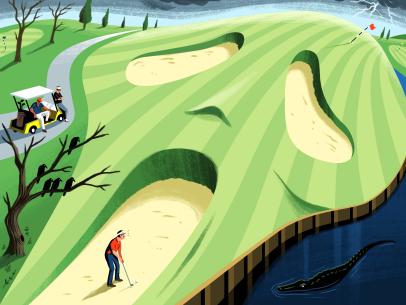This article first appeared in Low Net, a weekly newsletter written for the average golfer, by an average golfer. To get Low Net each week, sign up for Golf Digest+.
Have a topic you want me to explore? Send me an email and I'll do my best to dive in.
One of the familiar challenges that comes with loving golf is justifying the need to play more. I’ve trotted out some doozies over the years. “It’s sort of for work” sounds worthy. “I already told them I was in”—not as much.
Only recently have I considered framing it as a matter of life and death.
Am I exaggerating? Sure. My survival isn’t tied to my ability to shoot 86, and it would be silly to try to draw a straight line between rounds played and potential life span. Still, the best case for golf resonates at a deeper level.
With apologies to last week’s PGA Championship, the most important golf event of May is known as Mental Health Awareness Month. You probably recall how the game helped in the harrowing early days of the pandemic, when golf allowed millions out of the house and into open spaces, and the disappointment of three-putting was tempered by an additional layer of perspective. But the bar for healthy diversion might be lowest in the throes of an international crisis. More telling is how golf promotes well-being even as our normal rhythms have resumed.
There have been studies, like the one by the U.K.’s Dr. Roger Hawkes for the Golf & Health Project, that cites how golf can “reduce anxiety, improve confidence and boost self-esteem, all of which contribute to improved mental well-being.” Numerous outdoor activities with moderate exercise have been tied to lower levels of stress and depression; although given the additional lessons in humility and expectation management golf provides, I’d argue it goes further than hiking or cycling. All of these explain why even my wife has dipped her toe into golf after decades of loyalty to tennis.
In one crucial way, I might still benefit more than her. Another example often cited is that golf promotes social interaction, which is different than just saying it’s fun. According to the Center for Disease Control, “people with stronger social bonds have a 50% increased likelihood of survival than those who have fewer social connections.” This is true for both men and women, but studies have also shown that men struggle more to develop new friendships as they age, in part because male friendships are more likely to stem from a shared activity like those made through sports and work. These “shoulder-to-shoulder activities,” as the University of Maryland School of Social Work Professor Geoff Greif called it in his book, Buddy System, tend to dwindle with time, making golf a valuable exception.
“Golf is one of the few sports where you really have the opportunity while competing to actually communicate with somebody,” Greif told me in 2020. “In tennis and basketball, there’s not a lot of time. But in golf you have four hours. It’s a shoulder-to-shoulder activity but you also have a chance to talk a great deal.”
This all risks sounding like a convenient argument for a golf editor to make. Fair point. But remember, to know golf well is to also know the ways the game can drive you mad. Therein lies an irony. Of my closest golf friends, I find many tend to be sunnier people away from the course than they are on it. But I maintain the presence of golf in their lives serves them in ways you can’t always see. Mental health isn’t really about happiness. It’s more about feeling able to handle what’s thrown your way as best you can.



